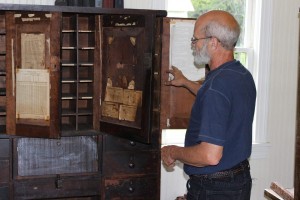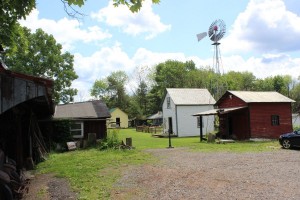RICHFIELD, Ohio — Jim Fry, founder of Museum of Western Reserve Farms and Equipment, has spent most of his life preserving cultures.
When he was a young man, he was asked to help deliver food and supplies to Native American people on reservations.
“I spent those 20 years saving the lives of American Indian people and their culture,” Fry said. “And I guess I’m spending this 20 saving our culture.”
Fry’s museum, a village of 1850- to 1920s-era buildings and equipment collected from locations across the Ohio Western Reserve, began more than a decade ago as a largely pragmatic venture.

“I’ve always been a farmer and have always needed equipment,” said Fry, who lives in a renovated Civil War-era house next door to the 250-year-old Fry family homestead in Summit County. “Some of it has been old, some new, but a considerable amount of it has been horse-drawn equipment.”
“I thought it wouldn’t be hard to find a mowing machine, a hay rake, a walk-behind plow,” he said of his early days of collecting. “Now I have 20 hay rakes and they are all different, made by different manufacturers.”
State and federal highway projects through Richfield in the late 1990s led Fry to speed up his collection of not only farm equipment, but entire historical buildings.
Thus began a treasure hunt that led to Fry moving 40 buildings, including a former one-room schoolhouse that also saw service as a home for an itinerant Depression-era family; a weaving mill donated by the Lewis family of Baltimore, Maryland; a broom-making shop; the original U.S. Post Office building in Randolph, Ohio, dating to 1825; and two blacksmith shops.
“The plan is to have every building and trade of a small town in the 1850s,” Fry said.
Local past revisited
In the late 1800s, the former Hotz Blacksmith Shop, now part of the Museum of Western Reserve Farms and Equipment, was once at the center of a thriving Richfield town center at the intersection of State Route 303 and Broadview Road. The town center also included a harness shop, collar shop, tin shop, Baptist Church, and the Knopp family homestead.
“The harness shop was given to the historical society and became the town hall, the Baptist church became Fellowship Hall, the tin shop was destroyed, I have two of (the buildings), and the village is still trying to figure out what it wants to do with the Knopp House,” Fry said.
He said the most daunting task has been convincing local government officials and historical preservation groups to save the history that already exists in the village.
Indeed much of the equipment originally used in buildings at the museum was found right under Fry’s nose.
Resting his hand on a nondescript block of iron with several grooves across its top, Fry recounted buying the piece at a local auction for $1. When a fellow collector asked Fry if he knew what he had just bought, Fry jokingly responded, “A boat anchor.”
“I knew it was a blacksmith’s forming block, but (the collector) told me ‘no, that was Mike Hotz’s forming block.’ That is how I’ve found a lot of this stuff, in bits and pieces and good luck,” he said.
Fry latest project is moving the 1890s-era Darrowville Post Office from its current location, in the parking lot of Empire Auto Sales, 5136 Darrow Road in Hudson.

Lost knowledge
Fry’s farm museum is unique in a number of ways, most notably its collection and storage of farm large farm equipment. While one may see a blacksmith shop at another restoration, Fry said, they can “be the blacksmith” at the Museum of Western Reserve Farms and Equipment.
“The best thing about doing what I do is that I get to do whatever I want to do,” he said as he walked past an out-of-place railroad crossing sign — transported to the farm because, quite simply, Fry likes trains.
He describes the museum as a “19th century village, organic farm and school dedicated to the preservation of the Western Reserve.”
He and his wife, Laura, sell local honey, maple syrup, produce, crafts, homemade soaps, and free-range eggs, as well as pumpkins and Christmas trees. Various tours, including historical birthday parties, are held on the farm.
The couple also teaches classes on heritage skills such as cheese- and soap making, organic gardening, natural dyes, and wild edibles.
Fry’s own family history in the area dates to before the Revolutionary War.
His grandmother five generations back was killed by Delaware Indians at the family’s home in central Pennsylvania, while the rest of the family was captured and “adopted” by the tribe. Another relative, a “great-great-great-great-great uncle,” Fry said, was arguably the first white settler in the area that became Richfield.
Still, it is more than nostalgia that keeps Fry going.
“For me, it’s not even the item, but the story behind it,” he said. “Sometimes these pieces are all that is left of that story. We are not only losing the items, but the knowledge of how they were used.”
He recently overheard a conversation that, had he not heard it, he would not have believed.
“These two guys were in line at Burger King and one said ‘what if the economy crashes and the trucks stop running, we will have no way to get food’ and the other one said, ‘yes we will; we can go to Burger King and they will have food.’ He had no clue. And he was serious.”
STAY INFORMED. SIGN UP!
Up-to-date agriculture news in your inbox!












Mr. Jim–our hats are off to you!
Please keep our farming heritage and history alive.
““To be ignorant of what occurred before you were born is to remain always a child. For what is the worth of human life, unless it is woven into the life of our ancestors by the records of history?”
…Marcus Tullius Cicero ca. 7 B.C.